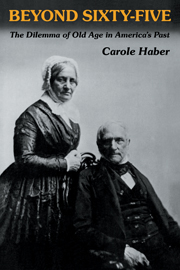Book contents
- Frontmatter
- Contents
- List of Tables
- Acknowledgments
- INTRODUCTION: Classifying Society's Superannuated
- CHAPTER ONE Aging in Colonial America
- CHAPTER TWO Social Realities and Perceptions of Old Age in the Nineteenth Century
- CHAPTER THREE Medical Models of Growing Old
- CHAPTER FOUR Treating the Postclimacteric Stage
- CHAPTER FIVE Institutionalizing the Elderly
- CHAPTER SIX The Pension Barrier
- CONCLUSION: Old Age in a Bureaucratic Society
- Notes
- A Note on Secondary Sources
- Index
INTRODUCTION: Classifying Society's Superannuated
Published online by Cambridge University Press: 26 February 2010
- Frontmatter
- Contents
- List of Tables
- Acknowledgments
- INTRODUCTION: Classifying Society's Superannuated
- CHAPTER ONE Aging in Colonial America
- CHAPTER TWO Social Realities and Perceptions of Old Age in the Nineteenth Century
- CHAPTER THREE Medical Models of Growing Old
- CHAPTER FOUR Treating the Postclimacteric Stage
- CHAPTER FIVE Institutionalizing the Elderly
- CHAPTER SIX The Pension Barrier
- CONCLUSION: Old Age in a Bureaucratic Society
- Notes
- A Note on Secondary Sources
- Index
Summary
Old age, in mid-twentieth-century America, is a stage of life both clearly and categorically defined. The man and woman who reach sixty-five seemingly undergo a dramatic change. Once beyond this year, they pass into the final stage of existence; they have become bureaucratically defined as geriatrics and senior citizens. Age, more than any other criterion, sets the elderly apart from society. Business policies, government regulations, and community standards uniformly dictate retirement. The active, as well as the sedentary, the healthy and the disabled are all perceived as superannuated.
The belief that disease and dependence often accompany old age is certainly not new. Few societies, in fact, have failed to recognize the infirmities of the elderly. Even in those cultures in which only a minority outlived adolescence, the presence of individuals of advanced age is a well-noted phenomenon. Since biblical times, the aged patriarch, stooped, bearded, and toothless, has served as a physical representation of the nature of senescence.
Every culture has also recognized that at some point elderly individuals may be forced to withdraw from society; the onset of physical or mental infirmities will hinder their activities. Regardless of past accomplishments or former skills, they might then find themselves judged incompetent. So stereotyped, the elderly will fall into a new category, that of the “overaged” or superannuated. According to anthropologist Leo W. Simmons, this is a classification that exists even in small, preindustrial cultures.
- Type
- Chapter
- Information
- Beyond Sixty-FiveThe Dilemma of Old Age in America's Past, pp. 1 - 7Publisher: Cambridge University PressPrint publication year: 1983

